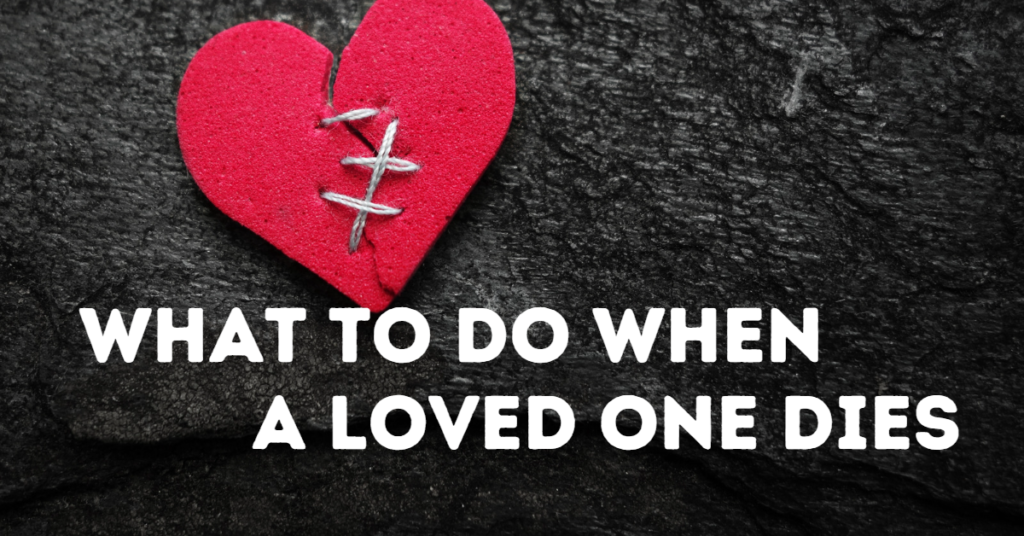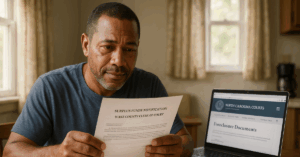What To Do When a Loved One Dies
And, a downloadable checklist!
While losing a loved one is never easy, carrying out their last wishes and settling their affairs doesn’t have to be quite as hard – and we’re here to help.

Be sure to also read about Estate Administration (Probate)
First and foremost, give yourself time to grieve
When a family member or other loved one dies, grief and shock can sometimes be overwhelming, so naturally, the last thing most people want to think about is making phone calls or funeral arrangements. Some things do not need to be done immediately, but there are some steps that should be taken soon after the loss of your loved one. We have put together the following information with the hope that it will help facilitate this process during a stressful and emotional time. Please remember, we are here to help and can do much of the legal process for you.
It’s normal to feel overwhelmed and confused. Give yourself adequate time and space to grieve the loss and process your emotions. It can be helpful to talk with supportive friends and family. It may help to create a meaningful tribute to your loved one, such as writing a letter, making a photo album, or planting a memorial tree. If you feel overwhelmed and hopeless for an extended amount of time, it may be useful to seek out professional help to help you cope with the loss. Remember, your loved one wouldn’t want you to stay sad forever. It’s OK to feel sad when you lose someone you love. Take things one day, or even one moment, at a time, and ask for help if you need it!
In the immediate minutes and hours after your loved one passes away, you DO NOT NEED TO DO ANYTHING.
It is okay to sit with your loved one for a while, even if your family member died in a hospital. Just let the hospital staff know if you need a little time or if there are any religious rituals or customs that you would like to observe before your loved one’s body is moved. It is important to give yourself time to call your pastor, priest, rabbi, or other religious advisors, as well as close family members or friends whose presence will be comforting.
One exception is if your loved one wanted to be an organ donor. In this case, the hospital where the death occurred, or if the death occurred at home, a nearby hospital, should be notified almost immediately so the appropriate steps can be taken. If you are not sure, check your family member’s driver’s license or health care directives. Even if your loved one has signed up for organ donation in a state or national registry, family members are responsible for making a final decision if a doctor lets you know that your loved one’s organs are medically suitable for donation.
As soon as you can or are able, you should obtain a legal pronouncement of death by a doctor or hospice nurse.
If no one is present who can make an official pronouncement of death, the body may be taken to the emergency room where a doctor can make the declaration. Barring the need for further medical examination or autopsy, a declaration will enable a death certificate to be prepared. A death certificate is a legal form that you must obtain before some of the later steps can be taken.
Make arrangements for the body
If your loved one died at home, they will need to be picked up, typically by a funeral home. If your loved one died in a hospital or nursing facility, the staff may be able to make those arrangements for you. Your loved one may have already chosen a funeral home and made funeral plans, but if not, the choice of a funeral home will be made by family members.
If necessary, arrange for care for any dependent children, adults, and pets in accordance with your loved one’s will or nomination of guardian, which should address those issues.
If there was no will or guardianship nomination, you may have to request that a court issue an emergency order to ensure that any children or dependent adults are properly cared for and protected.
Make arrangements to lock up your loved one’s house and car, and if the home will remain vacant, notify the police or the landlord to keep a closer eye on it.
A friend or family could also regularly check for mail or phone messages, clean out perishable food, and water plants.
Find out if your loved one made pre-arrangements for a funeral or memorial service
and if not, ask a family member or friend to help you make those arrangements. If your family member was a member of the military, let the funeral home know if you would like a military funeral and it can make those arrangements. Also, prepare an obituary and send it to the local newspaper and any other newspapers in which you would like for it to appear.
Once you’ve taken care of these initial concerns, it is time to begin the estate or trust settlement process–also called Probate (or Estate/ Trust Administration).
Although taking care of some aspects of administration on your own may seem simple, this process can actually be quite complex, and small mistakes can lead to a major headache down the road. It is important to contact an experienced probate and trust administration attorney to help you with the process, as well as any other legal matters that may arise during this difficult and emotional time.
You can contact us at any time day or night using the contact form at the end of this page. We are happy to help guide you through the legal process so you and your family members can focus on moving through grief toward healing.
If you are the Executor or will be the person in charge of handing your loved one’s affairs, there’s more on your plate.
If you’ve been appointed an executor of a loved one’s estate, or a successor trustee, and that person dies, your grief – not to mention your to-do list, including tasks ranging from planning the funeral, coordinating relatives coming in from out of town and (eventually) meeting with a trust administration or probate lawyer – can be quite overwhelming. First and foremost, take care of yourself during this emotional time.
To help you with the “business” end of things, here’s a quick checklist of crucial details that will make the trip to our office to handle the legal affairs easier. We know it can be difficult, but some of these things do have a deadline, so make sure that you reach out sooner rather than later to get the process started. The sooner you reach out, the sooner we will be able to take some things off your plate.
Secure the deceased’s personal property (vehicle, home, business, etc.). Do not let anyone use or have the property until it has been properly accounted for and legally disbursed to its rightful owner.
Notify the post office and forward mail.
If your loved one wrote an ‘ethical will’ (a document that shares one’s values, experiences, and life lessons), share that with the appropriate parties in a venue set aside for the occasion. You may even want to print it and make copies for some individuals.
Get copies of the death certificate.
We recommend at least 5 copies (you’ll need them for some upcoming tasks).Notify the Social Security office. (Note, it’s common for the funeral director to perform this task, but be sure it has been done.You can call the SS Office to report the death here:
1-800-772-1213 (TTY 1-800-325-0778)
and download How Social Security Can Help You When A Family Member Dies (PDF)Take care of any Medicare details that need attention.
Contact the deceased’s employer to find out about benefits dispensation.
Stop health insurance and notify relevant insurance companies.
Terminate any policies no longer necessary. You may need to wait to actually cancel the policies until after you’ve “formally” taken over the estate, but you can often get the necessary paperwork started before that time.
Get ready to meet with a qualified probate and trust administration attorney. Depending on the circumstances, a probate may be necessary. Here’s what you need to gather:
The deceased’s original will and/or trust. If the original of the deceased’s will or trust can’t be located, contact us as soon as possible and bring any copies you do have.
A list of the deceased’s bills and debts. It’s often easier to bring the statements or the actual credit cards into the office rather than try to write out a list, but do whatever is easiest for you.
A list of the deceased’s financial advisors, insurance agent, tax professional, and other professional advisors.
A list of the deceased’s surviving family members, including their contact information when available. Even if they’re not named in the Will or Trust, the attorney will need to know about everyone in the family.
Cancel your loved one’s driver’s license, passport, voter’s registration, and club memberships.
Close out email and social media accounts, and shut down websites no longer needed. Depending on circumstances, to take these steps, you may need to wait until you’ve “formally” taken over the estate, but you can often learn the procedures and be ready to take action. Your loved one may have designated someone as their legacy account contact.
Contact your tax preparer.
DOWNLOAD A COPY OF
‘WHAT TO DO WHEN A LOVED ONE DIES’ CHECKLIST BELOW
DOWNLOAD A COPY OF THIS CHECKLIST TO PRINT OR SAVE FOR FUTURE USE.![]()

You may be thinking about handling all the paperwork yourself. It’s a tempting thought – why not keep things as simple as possible? – but a “DIY” approach to this process might cost you and your family dearly.
Read on to understand why.
Consequences of Mishandling an Estate: Examples from Real Life
Example #1: Failing to disclose assets to the IRS.
Lacy Doyle, a prominent art consultant in New York City, inherited a large estate when her father passed away in 2003. He allegedly left her $4 million, but she only disclosed fewer than $1 million in assets when she filed the court documents for the estate. Per the New York Daily News: “She opened an ‘undeclared Swiss bank account for the purpose of depositing the secret inheritance from her father’ in 2006 — using a fake foreign foundation name to conceal her identity… [she also] didn’t report her interest in the hidden accounts — nor the income they generated — from 2004 to 2009.” As a result of these alleged shenanigans and Doyle’s failure to report the accounts to the IRS, she was arrested, and she now faces a six-year prison sentence.
Example #2: Misusing power of attorney.
Another famous case of an improperly handled estate involved the son of famous New York socialite, Brooke Astor. Her son, Anthony Marshall, was convicted of misusing his power of attorney and other crimes. Per a fascinating Washington Post obituary: “In 2009, Mr. Marshall was convicted of grand larceny and other charges related to the attempted looting of his mother’s assets while she suffered from Alzheimer’s disease. He received a sentence of one to three years in prison but, afflicted by congestive heart failure and Parkinson’s disease, was medically paroled in August 2013 after serving eight weeks.”
Some Key Takeaways
Seek professional counsel to avoid even the appearance of impropriety when handling an estate.
Bear in mind that errors of omission and accident can be costly – even if your intent was good. An executor who makes distributions from an estate too soon can get into serious trouble, for instance. An executor’s personal assets can wind up in jeopardy if his or her actions cause an estate to become insolvent.
Even if you’re well organized and knowledgeable about probate and estate law, it’s surprisingly hard to anticipate what can go wrong. There are many ways to end up in hot water when you’re handling the estate or trust of a loved one.
We’re here to help you steer clear of the obstacles and free you to focus on yourself and your family during this difficult time.
Contact us for help!
We can help you manage estate and trust related concerns as well as point you towards other useful resources.
As you can see, Probate or Estate Administration can be a difficult process. Be sure to make your own Estate Plan to help your loved ones avoid as much of the Probate process as you can.

…we have been working with Walls Law for almost 10 years and have been thrilled by the professional service that is provided.
K Miller
IF YOU NEED HELP WITH A LOVED ONE’S ESTATE,
WE’RE JUST A PHONE CALL OR EMAIL AWAY
WE ARE HERE TO HELP! We have a full-service probate division ready to help guide you through your loved one’s estate administration.
From opening the estate to filing the final accounting, we can help you navigate this process.
HOW CAN WE HELP?
-
More about Surplus Funds Claims
Keep learning about surplus funds in this supplemental post -
Unclaimed Foreclosure Money in North Carolina: How to Claim Surplus Funds | The Walls Law Group
Unclaimed Cash: North Carolina Surplus Funds Explained Have you received a... -
Succession Planning for Raleigh Business Owners
Running a successful business in Raleigh requires careful planning not...



